profession of faith catholic pdf
The Profession of Faith is a solemn declaration of belief in the core teachings of the Catholic Church, centered on the Nicene Creed.
Explanation and Significance
The Profession of Faith is a cornerstone of Catholic identity, serving as a formal declaration of belief in the essential doctrines of the Church. It encapsulates the core truths of Catholicism, including the Trinity, the divinity of Christ, and the authority of the Church. This solemn act signifies a deep commitment to the faith, uniting believers in a shared understanding of sacred truths. Its significance lies in its ability to inspire spiritual growth and foster unity among the faithful, reflecting the Church’s enduring teachings.
Historical Background
The Profession of Faith traces its origins to early Christianity, formalized in the Nicene Creed at the Council of Nicaea in 325 AD. It evolved through Ecumenical Councils, such as Constantinople in 381 AD, to counter heresies and unify beliefs. Over centuries, it became integral to Church liturgy, reinforcing Catholic doctrine during sacraments like baptism and confirmation. The Second Vatican Council influenced its modern presentation, while the Catechism of the Catholic Church underscores its enduring significance as a unifying declaration of faith.
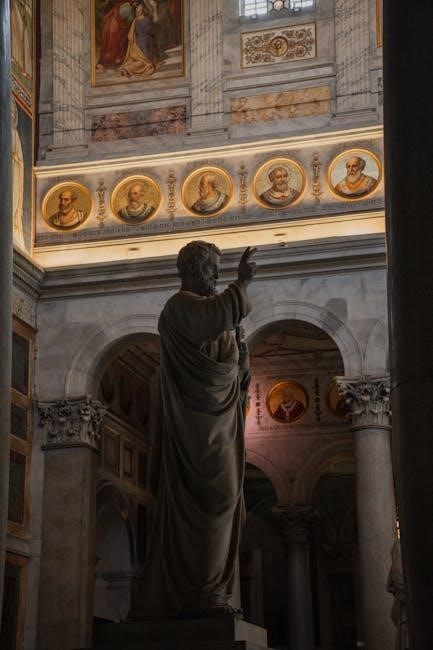
The Nicene Creed
The Nicene Creed is a foundational declaration of Catholic faith, affirming belief in one God, the Father, Jesus Christ, and the Holy Spirit, as professed at Nicaea.
Structure and Key Tenets
The Nicene Creed is structured into three main sections, each addressing a person of the Holy Trinity. It begins with God the Father, Creator of all, then transitions to Jesus Christ, emphasizing His divine nature, incarnation, and redemptive mission. Finally, it affirms the Holy Spirit as the giver of life. Key tenets include the oneness of God, the divinity of Christ, and the resurrection of the dead, all central to Catholic doctrine and the Profession of Faith.
Biblical Foundations
The Profession of Faith is deeply rooted in Scripture, drawing from key biblical truths. The Nicene Creed reflects passages like John 1:1-14, which affirm Jesus’ divine nature, and Acts 2:38, highlighting baptism for forgiveness. It also echoes 1 Corinthians 15:3-4 on Christ’s resurrection and Revelation 20:12-13 on the final judgment, ensuring that the Creed aligns with biblical teachings and reinforces the Church’s doctrinal foundation.
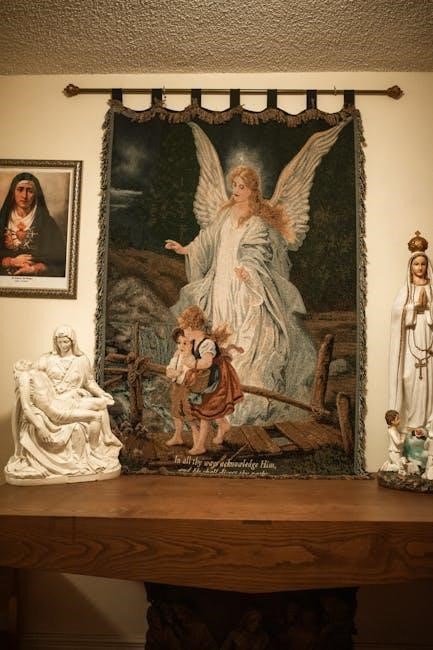
Role in the RCIA Process
The Profession of Faith is a crucial step in the RCIA process, where candidates publicly declare their beliefs at the Easter Vigil, followed by Confirmation and First Holy Communion.
Process for RCIA Candidates
The Profession of Faith is a pivotal moment in the RCIA journey, typically occurring at the Easter Vigil. Candidates publicly declare their belief in the Catholic faith, affirming the Nicene Creed. This step follows extensive catechesis and spiritual preparation, marking their full commitment to the Church. The profession is a solemn act, often witnessed by the parish community, and is immediately followed by the celebration of Confirmation and First Holy Communion, fully initiating them into the Catholic Church.
Ceremony and Celebrations
The Profession of Faith ceremony is a solemn event, often held during the Easter Vigil. Candidates publicly profess their beliefs, followed by the administration of Confirmation and First Holy Communion. The congregation witnesses this sacred moment, celebrating the candidates’ full initiation into the Catholic Church. The Profession is recorded in the Baptism Register and parish records, signifying their commitment. This joyful celebration marks their spiritual rebirth and integration into the Catholic community.
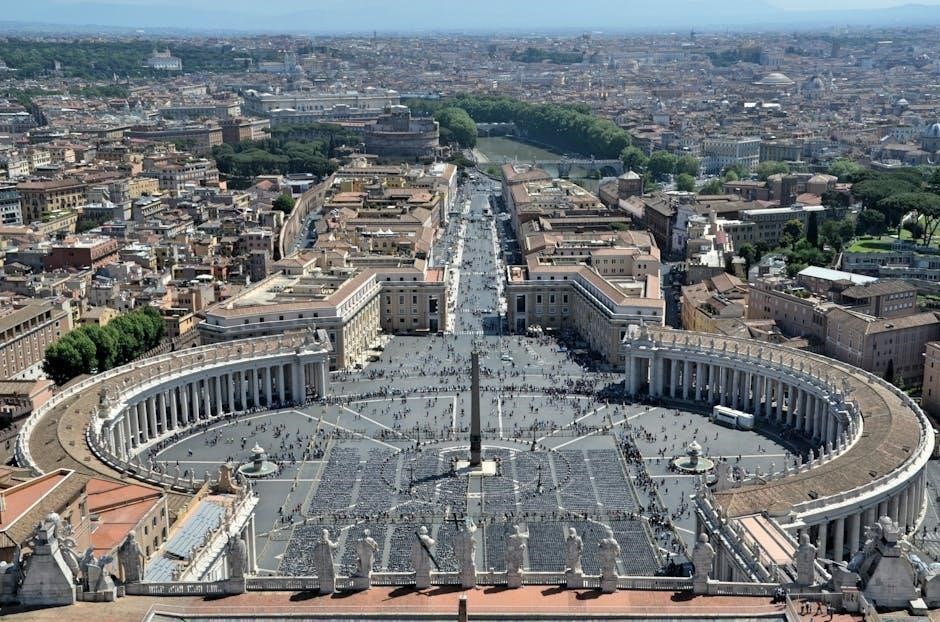
The Creed in the Catholic Mass
The Creed is a central liturgical prayer, recited during Mass, reaffirming the congregation’s belief in the Trinity and key Catholic doctrines, fostering unity and faith.
Liturgical Importance
The Creed holds a central place in the Catholic Mass, serving as a unifying declaration of faith. Recited by the congregation, it reaffirms belief in the Trinity and essential doctrines. Rooted in the Nicene-Constantinopolitan Creed, it underscores the Church’s teachings, strengthening the community’s shared faith. This liturgical prayer bridges the gap between individual devotion and communal worship, fostering unity and reinforcing the mysteries of the faith celebrated in the Eucharist. Its recitation is a powerful moment of collective profession and spiritual renewal for the parish.
Congregational Participation
Congregational participation in the Profession of Faith strengthens communal worship and unity. Recited aloud during Mass, the Creed unites believers in affirming core doctrines. This collective declaration fosters a sense of shared identity and reinforces the Church’s teachings. By actively professing their faith, the congregation engages in a powerful spiritual act, deepening their commitment to Catholic beliefs. This shared recitation becomes a moment of solidarity, emphasizing the universal truths of the faith and enriching the liturgical experience for all participants.

Historical Development
The Profession of Faith evolved from the Apostles’ Creed, with the Nicene Creed emerging from ecumenical councils like Nicaea (325 AD) and Constantinople (381 AD) to combat heresies and solidify doctrine.
Ecumenical Councils
The Nicene Creed, central to the Profession of Faith, emerged from the Councils of Nicaea (325 AD) and Constantinople (381 AD), addressing Arianism and affirming the Trinity. These councils defined the divinity of Jesus Christ and the Holy Spirit, establishing the Creed’s authority. The Creed’s universality and liturgical use reflect its ecumenical origins, reaffirming Catholic doctrine and unity across centuries.
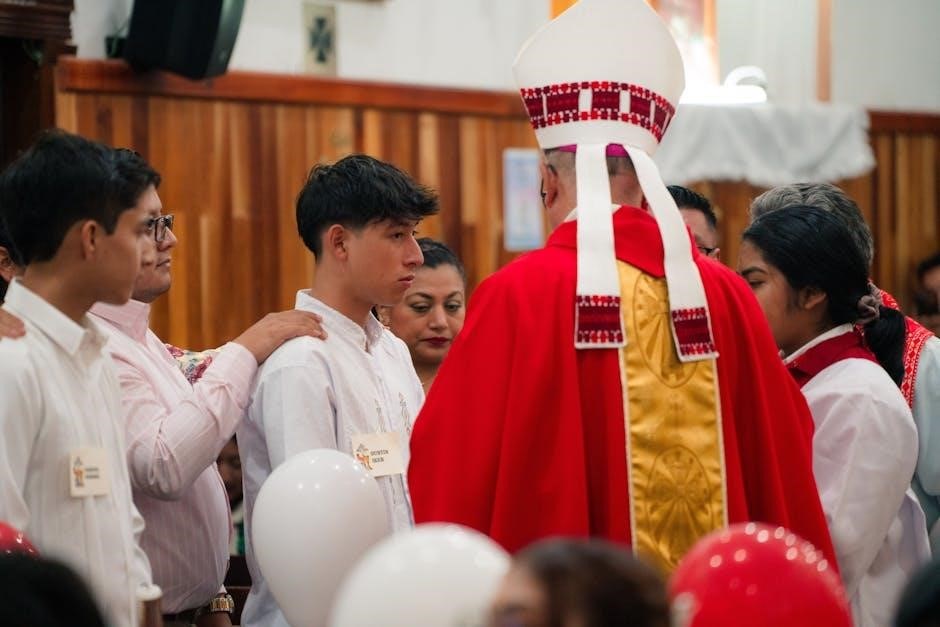
Papal Influence
The Profession of Faith has been shaped by papal authority, with the Pontifical Council for the Doctrine of the Faith promulgating it in 1998. This declaration reflects the Pope’s role in safeguarding Catholic doctrine, ensuring its continuity and fidelity. Historically, popes like Pius IV have influenced the Profession of Faith, emphasizing its alignment with the Magisterium. The Profession serves as a public commitment, affirming the Church’s teachings and the Pope’s guidance in upholding the integrity of Catholic belief.

The Creed in Catholic Teachings
The Creed is central to Catholic doctrine, as stated in the Catechism, reflecting the Church’s authoritative teachings on the Trinity and divine mysteries;
Reference in the Catechism
The Catechism of the Catholic Church emphasizes the Profession of Faith as a cornerstone of Catholic doctrine, referencing the Nicene Creed in §465. It underscores the Creed’s role in summarizing the mysteries of the faith, particularly the Trinity and the Incarnation. The Catechism elaborates on the Creed’s teachings, providing a comprehensive guide for understanding and professing the faith. This reference highlights the Creed’s significance in Catholic teachings and its enduring relevance in the Church’s doctrinal framework.
Moral and Doctrinal Implications
The Profession of Faith carries profound moral and doctrinal implications, shaping the believer’s commitment to Catholic teachings. It affirms the Trinity, divine revelation, and the Church’s authority, guiding ethical living and spiritual growth. By professing the Creed, individuals embrace a life aligned with Catholic moral values and doctrines, fostering unity and fidelity within the Church. This declaration serves as a foundation for personal integrity and communal faith, reflecting the Church’s enduring moral and doctrinal traditions.
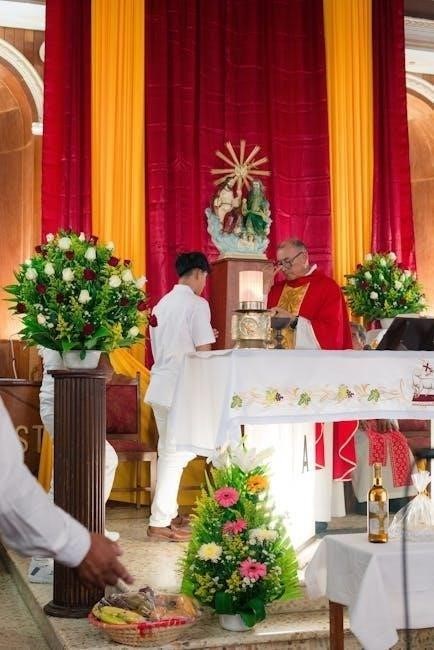
Commitment to the Faith
The Profession of Faith is a personal and public declaration of dedication to Catholic beliefs, reflecting a deep commitment to living according to Church teachings and values.
Role of Clergy
The clergy play a vital role in the Profession of Faith, guiding RCIA candidates through their spiritual journey and ensuring a profound understanding of Catholic doctrine. They officiate the ceremony, administer sacraments, and maintain accurate records. Clergy also provide spiritual support and promote ongoing faith formation, ensuring the Profession is a meaningful step in the candidate’s life. Their leadership is essential for upholding the integrity of the faith.
Responsibilities of the Laity
The laity plays a supportive role in the Profession of Faith by living as witnesses to the Catholic faith. They participate in communal celebrations and ceremonies, fostering a sense of belonging among believers. The laity is also encouraged to deepen their understanding of Catholic teachings and to uphold them in daily life. By actively engaging in parish life and sharing their faith, they contribute to the spiritual growth of the community and support those professing their faith.
The Profession of Faith remains a cornerstone of Catholic identity, reaffirming core beliefs and guiding future generations in fidelity to God and His Church.
Reaffirming Catholic Beliefs
The Profession of Faith reaffirms essential Catholic doctrines, emphasizing the Trinity, resurrection, and the Church’s role. It reflects divine love and unity, serving as a commitment to these truths and fostering unity among believers.
The Future of the Profession of Faith
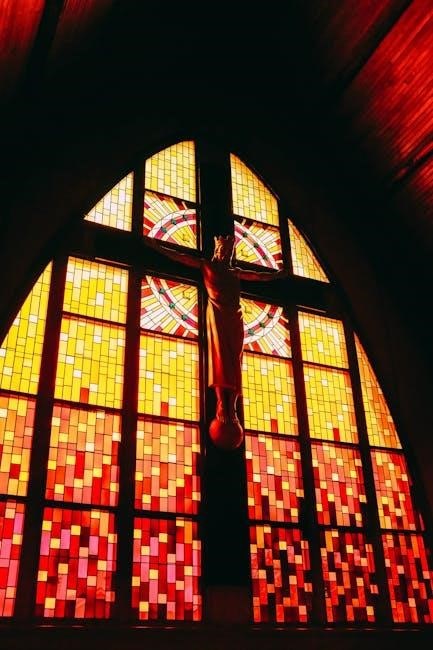
The Profession of Faith will continue to be a cornerstone of Catholic identity, guiding future generations in understanding and living the teachings of the Church. It will evolve to address contemporary challenges while remaining rooted in timeless truths. As the Church grows, this Profession will inspire renewed commitment to evangelization and unity, ensuring the faith remains vibrant and relevant in a changing world.
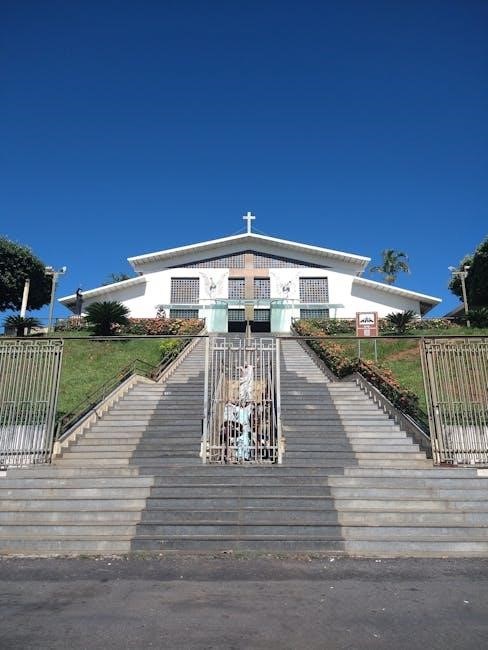







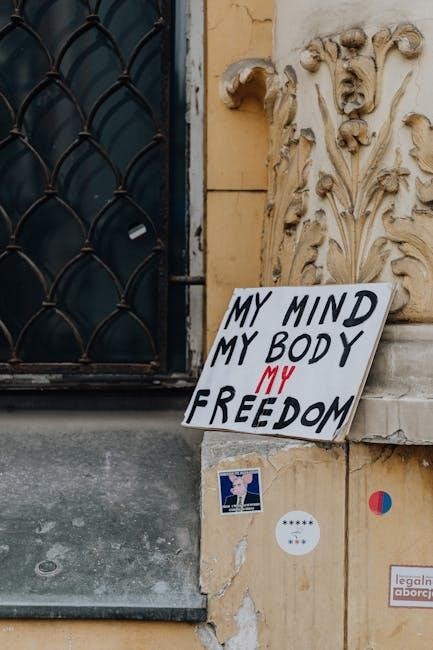

Leave a Comment